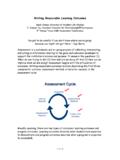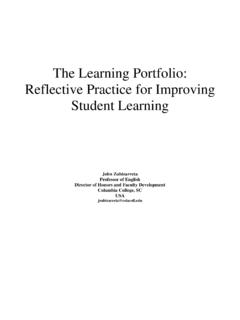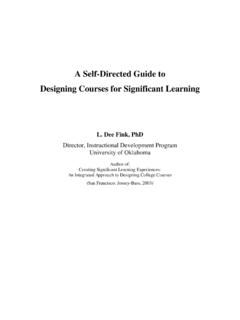Transcription of Assessment of Higher Education Learning Outcomes ...
1 OECD 2013 Assessment of Higher Education Learning Outcomes feasibility study Report Volume 1 Design and implementation Executive Summary This first volume will be followed by a second volume on Data Analysis and National Experiences at the end of February and a third and final volume on Further Insights (including the March Conference Proceedings) at the end of April. The complete Volume 1 can be found on the AHELO website ( ) Executive Summary 2 OECD 2013 In a complex, ever changing and growing Higher Education context, where a variety of rankings are often being used as the yardstick of academic excellence, there is a clear need for a way to effectively measure the actual Outcomes of teaching and Learning . The OECD s Assessment of Higher Education Learning Outcomes (AHELO) aims to provide a tool for Higher Education Institutions (HEIs) to assess what their students know and can do upon graduation, on an international scale.
2 This tool can play a key role in supporting of HEIs in their efforts to improve the Learning Outcomes for their students. The feasibility study , which concluded at the end of 2012, was conducted to test the scientific and practical feasibility of such an Assessment across diverse national, cultural, linguistic, and institutional contexts. Participating countries and various international expert groups participated in the development of Assessment instruments for the three strands chosen for the purpose of the feasibility study (generic skills, economics and engineering) and the contextual questionnaires which were then administered to students in participating institutions. This implementation of the test involved a total of 249 HEIs in the 17 countries and regions, and the instruments were administered to close to 4 900 faculty and some 23 000 students (close to the end of a Bachelor s Degree). The first volume of the feasibility study report examines the process for the initial development of the feasibility study (why it was thought necessary to begin with, how it was developed, the challenges which had to be overcome, etc.)
3 And the instrumentation and implementation of the survey. Chapter 1 - The rationale for an AHELO: Higher Education in the 21st Century context There is widespread recognition that skills and human capital have become the backbone of economic prosperity and social well-being in the 21st century. In this context, Higher Education plays a central role and has become increasingly important on national agendas. Global trends in Higher Education A number of global trends have shaped the development and wide-ranging mutations of Higher Education over the past half century. Once defined in terms of an ivory tower model of traditional research universities attended by the elites, Higher Education today is characterised by massive expansion and wider participation; the emergence of new types of institutions (vocationally-oriented and private providers); more diverse profiles of institutions, programmes and their students; broader adoption and more integrated use of communications and educational technologies; greater internationalisation, competition and signalling mechanisms; growing pressures on costs and new forms of financing; as well as new modes and roles of governance, including increasing emphasis on performance, quality and accountability.
4 The quality challenge and limitations of diverse attempts to fill the quality information gap With the massive expansion of Higher Education systems and wider participation, there are persistent concerns on the quality and relevance of students preparation for Higher Education in spite of the development of more sophisticated quality assurance systems in most OECD 3 AHELO feasibility study Report - Volume 1 OECD 2013 countries since the early 1980s. OECD Education Ministers meeting in Athens in June 2006 committed their countries to the goal of raising the quality of Higher Education . But despite quality assurance systems and the remarkable development of performance indicators worldwide, data on the Learning Outcomes of Higher Education remains scarce in many systems. The OECD Thematic Review of Tertiary Education recommended in 2008 to increase the focus on student Outcomes to alleviate this problem and to address concerns about quality of Learning Outcomes in Higher Education .
5 The rationale for an AHELO The proposition to explore the development of an international Assessment of Higher Education Learning Outcomes (AHELO) emerged during the Athens Meeting of OECD Education Ministers in 2006, at a time of great pressure to develop better performance metrics in Higher Education . This proposition is illustrative of a paradigm shift for Higher Education , which manifests itself in several ways: Move beyond collegial approaches to governance - Higher Education has seen a shift of emphasis from collegial approaches of governance by communities of scholars towards models combining greater autonomy with increased transparency and accountability. This new paradigm has led to increased demands for institutions to engage in Outcomes Assessment . Growing focus on student Learning Outcomes - Another trend sees a shift away from inputs towards outcome -based notions of Higher Education throughput.
6 This shift has been most evident with the Bologna Declaration which aimed at establishing a European Higher Education Area and to write all Higher Education programmes in terms of Learning Outcomes by 2010. This trend is becoming global with many countries aligning their systems to be Bologna-compatible. Emphasis on student centred Learning and research on teaching- Learning processes - The turn of the Century has also seen a shift in undergraduate Education , from an instruction paradigm towards a Learning paradigm in which the emphasis is no longer on the means but on the end. A corollary of this emphasis is to better understand the teaching- Learning interplay. In this context, Outcomes assessments are important for the evaluation of instructional effectiveness. AHELO within the broader movement towards competencies and Learning Outcomes - While AHELO is the first international attempt at measuring Learning Outcomes across borders, languages and cultures, it is part of a broader context of distinct initiatives converging in their focus on performance, competencies and Learning Outcomes .
7 These include initiatives collecting data to be used as indirect proxies of Outcomes and performance, focusing on the definition of expected Learning Outcomes or attempting to measure Learning Outcomes achieved by students. Together, these patterns have shaped the context of the OECD AHELO initiative. Learning Outcomes are indeed a key factor of institutional performance but while indirect evidence can Executive Summary 4 OECD 2013 be gained from proxy measures there are no instruments for international measurement. AHELO has the potential to fill this gap by directly assessing student performance and the feasibility study was designed to see whether it could be done. Chapter 2 - The beginning of AHELO: decisions and challenges Questioning feasibility : Key challenges in developing and operationalising an AHELO The notion of exploring the development of an international AHELO generated much discussion throughout 2006-2008 in Higher Education circles.
8 Some policy makers, experts and stakeholders embraced the idea enthusiastically and participating actively in its development, while others were more critical of the approach and vocal in pointing to its potential risks. Overall, concerns focused on the following points: risk that AHELO data would be used: as a ranking, despite the fact that AHELO was never envisaged as a ranking tool within OECD circles. as a basis for (re-)allocating public resources. as a basis for reallocating funding within HEIs towards teaching to the detriment of other missions. the complexity of engaging in fair comparisons of extremely diverse institutions in terms of their missions, profiles and student bodies. Detractors highlighted the limited information that standardised tests can yield for institutions and faculties and the risk of simplistic conclusions. the potential impact on institutional autonomy and academic freedom and fears that AHELO might be forced on institutions and could over time yield homogenisation and constrain academic freedom.
9 The merits and applicability of AHELO s focus on generic skills given different academic traditions in different parts of the world and fundamental debates on the relevance of assessing generic skills independently from the disciplines. Expert meetings framed a roadmap Fully recognising the specificities of Higher Education and the particular challenges associated with developing an Assessment of Learning Outcomes at that level, the OECD convened three international expert meetings throughout 2007 to provide recommendations on how to take the AHELO idea forward. The experts: identified considerable challenges to developing internationally comparative measures of Higher Education Learning Outcomes , although none considered the goal unattainable recommended establishing measures of Learning Outcomes at the level of institutions or departments, at least initially. 5 AHELO feasibility study Report - Volume 1 OECD 2013 advised to focus on students at the end of a three or four-year degree as a meaningful target population, and agreed that there was little point in reporting data at the level of individual students.
10 Acknowledged that there was no generally accepted definition of what Higher Education Outcomes ought to be, and suggested that the feasibility study should encompass two strands one on transversal Higher -order competencies and another one on discipline-related competencies. stressed that a fully developed Assessment was beyond the scope of this initial project, and instead suggested to draw upon existing assessments, flagging the CLA approach for the generic skills strand due to its high degree of face-validity. agreed that an Assessment of subject-specific competencies would also be needed, and recommended conducting the feasibility study in subject areas that have a stable core of methodologies such as engineering or economics. suggested to draw on a diverse sample of countries and to involve a limited set of volunteer institutions for the feasibility study .

















